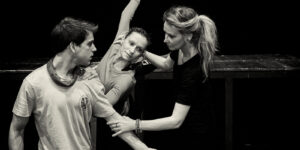J.K.Tyl Theatre - 1/2009 - Eva Ichová asked
Alena Pešková, former soloist of the Pilsen Ballet (among others The Lady with Camellias, Lady Macbeth, Pamina), has been working with DJKT for many years as a choreographer. In addition to the dance component of opera and musical productions (e.g. A Clockwork Orange, The Cunning Little Vixen), in 2006 she staged the ballet The Garden at the Bolshoi Theatre, based on a theme by Jiří Trnka, and Marysa will therefore be her second full-length ballet title.
In what form did you first encounter Marysha and when did you start thinking about a ballet rendition of the theme?
Strangely enough, I didn't first meet Marysha in the theatre, but as a teenager I read Mrštík's drama. And it's quite interesting what emotions prevailed in me after reading it then and what I feel about Marysha today... Of the stage performances I remember of course Jan Burian's 1996 Pilsen production, which impressed me, then Pitínský's production at the National Theatre in 1999, and the last time I watched a DVD recording of Grossman's 1981 production of Marysha at the Klicper Theatre in Hradec Králové.
What do you feel is the greatest strength of this village drama from the end of the previous century?
The power, in my opinion, lies in its timelessness. Because if we strip away all the specifics, we are left with two fundamental clashes - the individual and society and the clash of two generations. And these are eternal problems, which are far from having passed away with the century before last, and which every person, whether he wants to or not, will encounter at least once in his life. The society in which we find ourselves has its rules - a theme which is in a way symbolized in our production by the visual element, straw = inclusion, restriction, obligation (the contribution of the set designer Prof. Jan Dušek). As long as we follow these rules, society accepts us and we can feel safe. As soon as we start to feel these rules as limitations, there is a problem. We long for free action, but do we dare to act freely? Maybe... But then we are not accepted by society, we are excluded, not included... And many people simply could not exist without such inclusion. Of course, it's not just a question of running away from my husband and my lover. That's almost laughable nowadays. Nowadays, many things that used to be fateful are relegated to the category of awkwardness: if I use a very old mobile phone in a certain company, I'll just be out of place. Then I can buy a better one and be "in", or I can stand by my "awkwardness". If I can do that, maybe society will think... And isn't it individuals and their personal tragedies that change the rules of society? The clash of generations is a topic that is relevant in every age. The younger generation fights for something, and when it finally succeeds in achieving it, there are its children, who find everything a cliché, tearing down what their parents have built and fighting for something completely different. In Marysha's case, it is the case that for her parents certain rules could still work, but not for Marysha anymore. They could still believe that only obedience to parents brings blessings, but by the time of Marysha's wedding, society was already elsewhere... The indications were there: illegitimate children, alcoholism. Belief in God had been displaced...
To what extent do you keep the libretto faithful to the source material?
The libretto is written in such a way that everything that is essential in Marysha can be understood. However, I did not want to "describe" too much, so it was necessary to omit some plots that would not be understandable without the help of words. On the contrary, I deepened the moments that dance or gesture can express very well. I gave the libretto to Prof. Jan Burian to read, and then accepted his recommendations for certain modifications, for example, highlighting the importance of the company, the chorus. In addition, two acts, or images if you like, have been added to replace certain dialogues.
The choice of the composer of the music is crucial for the new production. How did you find the composer Petr Wajsar?
I first saw and heard Peter at the Blues Cellar, a music club run by my friend and former Pilsen theatre dancer David Dvořák. I liked his music from the beginning, so I went to see him on a separate night. Then I got a good reference from his professor Mr. Václav Riedelbauch, and well, it was...
I can't imagine how you were able to formulate an assignment for a person so completely "out of the field".
I was still writing a strange, quite detailed script for Peter, we were talking about feelings, and I was telling him what I didn't want. So far it seems to me that we understand each other, but I don't want to jinx anything, it's not finished yet...
Anyone who remembers your great Pilsner roles will inevitably think that Marysha would be an ideal role for you. Is it possible you wouldn't wish to dance her?
No, it's not possible! I want to dance it so badly. First of all, it's an amazing acting thing, and secondly - I choreograph on my own "spindly" feet, so perfect! I'm already thinking about how I'm going to disarm both of her performers... :)



Comments are closed.